- Home
- Linda Newbery
The Key to Flambards Page 6
The Key to Flambards Read online
Page 6
‘Wouldn’t that be a dodgy deal? Trying to make sure Flambards fails, so that he can buy the land and make money from it?’
‘I don’t think he’s doing that. He started out with the best intentions, Roger said, but things haven’t gone as well as expected, and he’s a businessman after all.’
‘So how much land would he want?’ Grace asked, thinking that there was an awful lot of it round here. Maybe Mr Naylor could build his houses in a small field somewhere out of sight.
But her mother said, ‘Long Meadow. The field between the stable yard and the wood. There’s space for twenty or more houses. That could bring him a small fortune, I imagine.’
‘But not there!’ Grace’s eyes swung in that direction, though the corner of the house and the rose arch were in the way. ‘That’s about the worst possible place!’
She thought of Jamie, and of the wood: the almost holy quiet of the trees, the green canopy overhead and cool space beneath. It wouldn’t be the same with a housing estate butting up to the edges.
Mum wiped her fingers on a piece of kitchen towel and passed Grace an apple. ‘People need to live somewhere, Gracey.’
‘I know. But not here! Not in smart new houses. It would spoil it all. What would Christina think?’
‘Christina?’ Her mother looked at her sideways.
‘I just meant …’ Grace mumbled. ‘It wouldn’t be the same. I mean, there are changes already, but it can’t be all that different from how Christina would have known it. And Granny Izz.’
‘I know. But it can’t be kept in mothballs. It has to pay for itself.’
‘But what about all those arty people?’ Grace asked. ‘There were loads of them, and I heard some of them say they’ll come back next year. How many more do you need on the courses?’
‘This week was one of the successes,’ Mum told her. ‘Quite a few other courses have been cancelled – there weren’t enough takers. We’re having a good look at the programme to see how we can improve it. So you see, I’m a kind of gamble. Mr Naylor made that clear this morning. They can’t really afford another member of staff, but they’ve taken me on for six weeks to work on marketing and publicity, and see if I can make a difference.’
That sounded like a big responsibility. Grace knew that her mother had a good reputation for her freelance work, but usually that was for small restaurants and hotels, a few days’ work here and there. She hadn’t done anything on this scale.
‘Can you make a difference?’
‘Only wish I knew. I’ve got some ideas. I’d better get back to the office. What are you doing this afternoon?’
‘I’ll probably go down to the lake.’
Grace had been reading for most of the morning, one of the novels she’d borrowed from Marie-Louise. They did a lot of book-swapping and sharing. Last year they’d read everything they could find by Catherine Johnson and Anne Cassidy; more recently it had been Elizabeth Wein, Mal Peet and Patrick Ness.
But she’d had enough of reading for now, and was restless. She wondered if Jamie would avoid her after her sulk yesterday. She couldn’t blame him if he did.
As she came round to the stable yard, taking the back way through the garden, she heard the sound of hooves on gravel. Not wanting another encounter with uppity Charlie, she slowed her pace, but saw that the horse that had just come through the gate was a good bit smaller, a pony, with Jamie on its back. He saw her and waved.
‘Hello!’ he called. ‘I was coming to look for you.’
She went over. The pony, dark brown with a thick black mane and tail, turned its head as she approached. It had a pretty face, with a diamond-shaped white star on its forehead and bright eyes that looked at her in a friendly way from under a bushy forelock. Jamie’s legs were long against its sides.
‘This is Plum.’ He patted her neck.
‘Plum!’
‘Her proper name’s Victoria Plum.’
Grace laughed. All these animals – Plum, Sirius, Flash and Cat Siggy – each had a name that meant something to the person who had chosen it, each with its own personality and presence. She’d never had much to do with animals before, only seeing them on TV. And there was something a bit plummy about the pony; her plump rounded sides, and the colour of her coat – not glinting chestnut like Sirius’s, but a glossy darker shade with a sheen on it like a ripe fruit ready for eating.
‘Whose is she, then? Not yours?’
‘Well, ours.’ Jamie swung one leg over the pony’s neck and dropped down to stand beside her. ‘She was Charlie’s, her first pony. Then Charlie got too tall for her and wanted to do competition stuff, and she needed a bigger horse for that and got Sirius. But we’ve had Plum for ages and it wouldn’t seem right to sell her.’
‘No!’ Grace agreed.
‘Charlie doesn’t ride her any more, but I do, now and then. Otherwise she just stays out in the field and keeps Sirius company. On a pony you can sometimes get closer to deer and badgers and things than when you’re walking. Anyway, I’ve brought her over so you can have a go.’
‘Me? At riding?’
‘She’s just the right size for you, and she’s very well-behaved. I thought, you know’ – he flushed slightly– ‘with your leg. People do ride, I mean people like you. It won’t be a problem, once you get used to it.’
People like you. Disabled people. But he hadn’t actually said it. Sometimes people didn’t know what to say: whether it was best to say nothing at all, or risk coming out with the wrong thing. By now Grace was used to that.
‘But I’ve never been on a horse.’ She wondered if some-one else had suggested this; Roger, probably. Surely not Charlie.
‘No problem. I can teach you. I mean, I’m no expert, but I can get you started. You can see if you like it.’
‘OK then. Thanks!’ At once Grace was eager; she could be like Christina, learn to ride. ‘How do I get on?’
‘You’d better wear this.’ Jamie took off the helmet he was wearing and helped her to fasten the chin-strap; then he demonstrated how to mount: left foot in the stirrup, left hands holding the reins in front of the saddle, a light hop up. He made it look so easy, but for Grace, without a flexible right foot and ankle to spring from, it proved to be a clumsy scramble, while Plum stood patiently.
‘Oh …’ Grace felt herself clenching up in frustration: thwarted by something that would have been so simple, before.
‘It might be easier getting up from the other side. Or you could even use the mounting-block. But you’re on now.’ Jamie helped her adjust the stirrups to a comfortable length, and showed her how to hold the reins. Then he opened the field gate and the pony followed him through.
Although Plum wasn’t a tall pony, Grace felt high up, though quite secure in the comfortably padded saddle. Plum walked alongside Jamie, obedient as a dog.
‘Relax your hands – there’s no need to grip the reins tightly. She’s not going to gallop off. That’s better.’
Anxious and tense at first, Grace realized that there was little to do other than move gently with the pony’s stride. They reached the fence at the far end, and Jamie said that she could ride back by herself, while he walked a few paces behind.
She was actually riding! On her own! The pony stepping out beneath her, the bushy mane in front, little curved ears pricked alertly – she began to thrill to the new experience, already wanting more.
‘Oh, aren’t you lovely!’ Stopping at the gate she leaned forward, full of gratitude, inhaling the warm horsey smell.
‘Cool!’ said Jamie, coming alongside. ‘You’re doing fine. Now we’ll try a trot. You need to squeeze with your legs to make her go faster – a squeeze, not a kick. Do you know what I mean by rising trot?’
She didn’t. Jamie explained, and made her practise at a standstill, rising in her stirrups, then sitting lightly; up, down. This was harder, making her feel lopsided. She saw that the idea was to let the weight drop into her heel – easy enough on the left side, impossible on the right, wher
e her foot kept slipping out of the stirrup and she had to look down to fumble it in again. She found a way of pressing down with her knee in an effort to stop that from happening.
‘We’ll give it a try, anyway,’ Jamie said. ‘Hang on to her mane if it helps you balance, and shout if you want to stop. Right. Let’s go.’
Grace’s left leg closed in to the warmth of the pony’s side, while her right leg was rigid and unfeeling, but Plum, encouraged by Jamie, moved into a smooth trot.
Rise and sit. Rise, sit. She concentrated hard, Jamie jogging alongside.
‘Nearly – keep going …’
‘Oops …’ She lost it, bumped, clutched the pony’s mane, then found the rhythm again. For the next few strides it felt almost easy.
‘That’s it – you’ve got it – great!’ Jamie slowed, bringing Plum back to a walk. ‘Not bad! It takes some people much longer than that to get rising trot. It’ll be easier next time.’
Next time! Grace liked the sound of that.
‘We’ll just walk a bit more now,’ Jamie said. ‘We can take her into the woods if we go round by the bridge.’
Brown butterflies fluttered up from the long grass as Jamie’s feet and the pony’s hooves brushed through. Grace thought of what Mum had told her earlier, and thought of diggers moving in, churning everything up, to build houses and roads and garages – noise and uproar destroying this peaceful meadow. No! That surely couldn’t happen, not here, where the house had looked over its quiet fields and woods for more than a hundred years. Those earlier Russells, the riding and hunting Russells of Christina’s day, must have ridden over this same field more times than could be counted. She almost said something to Jamie, then thought better of it; this was his special place, and he’d hate the idea more than she did.
They had come to an earth bridge over the slow-running stream that flowed into the woods. Jamie lifted a chain from the gate on the other side, and she had to concentrate on ducking underneath low branches.
When they reached the hide Jamie showed her how to dismount, and tied Plum’s reins to a slender tree trunk. ‘You shouldn’t really tie a horse up by the reins – a nervous one might pull back and break them. But Plum doesn’t mind.’
There seemed to be a proper way of doing everything. The dismounting was different from the casual way he’d done it earlier; instead she had to lean forward and swing her right leg over the pony’s back. It felt awkward, but easier than getting on, at least.
The small brown diving bird Grace had seen was busy on the lake again today; Jamie was pleased, and identified it as a little grebe. ‘I haven’t got my binoculars, or you could have a better look.’
She remembered the unseen bird that had sung so impressively, and told him about it. ‘So loud! It seemed to fill up the whole wood.’
‘A nightingale!’ he said at once, delighted. ‘Must have been. We get them here sometimes, but not that often.’
‘I thought nightingales only sang at night?’
‘That’s what a lot of people think. They do, but in the daytime too. It’s just that not many birds sing in the dark, so people notice them then. But they’re not very common. Perhaps it’s still around.’
When they went back to Plum, Jamie said he’d lead her as far as the bridge and then ride home. ‘If you’re OK walking back. It’s hardly worth you getting back on, for such a short way.’
Grace felt a little disappointed that she wouldn’t be doing any more riding today. ‘OK.’
At the gate Jamie vaulted into the saddle and lengthened the stirrups for his long legs. ‘I’ll bring her over again tomorrow, if you want?’
‘Thank you! That was lovely!’
Grace walked back across the field, marvelling at the unexpected turn the afternoon had taken. She sure wasn’t how she felt about having to be grateful to Charlie, but she wasn’t going to let that spoil the pleasure of finding something she could do. And do well? She would certainly try her hardest.
The dance group arrived. There were twelve of them: some in a minibus, others in their own cars, calling to each other as they unloaded their bags in the car park. They were in their late teens or early twenties, mainly female, a few young men. Intrigued, Grace watched them, noticing their clothes – leggings or loose pants, slouchy tops sliding off shoulders, wide headbands – and their graceful way of carrying themselves. They might have been a rare, exotic species. Coming in to dinner some of them smiled in her direction, and one girl said hi. Otherwise they were absorbed in conversation. At one point, a beautiful black girl stood up to demonstrate a dance move between the tables; she crouched low, then rose on one planted foot, the other leg, long and slender, sweeping up and out behind, an arm scooping over to catch the raised foot – impossible, and so easy. Grace looked down at her plate then back at the group, fascinated, envious.
In the morning she saw them drifting over to the studio; she heard the same girl’s infectious laugh and saw her perform a few twirling steps as she walked. It seemed that she could never quite stop dancing. Grace itched to watch them warm up and practise, knowing that it would only fill her with sadness and loss. It wasn’t that she had ever wanted to be a dancer. It was just another choice she didn’t have now: to be perfect, agile, beautiful to watch; drawing people’s gaze to her, as this girl did.
But now there was riding. Today she would ride Plum again.
For a moment, last night, she’d thought Mum was going to spoil that.
‘I wish you’d told me first. What if something happened?’
Because of your leg, she meant.
‘But it didn’t. Won’t. Don’t worry, Mum! Plum’s really good, and Jamie was there. And I wore a proper hard helmet.’
‘All the same, I’m not sure about it. Don’t take chances. And we’ll mention it to Zainab, next time we go.’
Zainab was Grace’s physiotherapist – lovely, kind, generous with praise and encouragement to Grace for doing her exercises so thoroughly. Grace always looked forward to her visits. Oh, Zainab just had to think riding was a good idea!
Today she managed rising trot with only one lost stirrup and a little bumping. Again Jamie said she was doing well, and told her to ride all the way round the field by herself while he waited at the gate. The pony was so amenable that all Grace needed was a little pressure on the rein to turn, a light squeeze of leg to go faster. Almost, Plum seemed to know what to do before Grace had given the smallest signal.
She asked Jamie to take photos with her mobile phone. Later, looking at them, she saw herself smiling and confident in the saddle. I look like a proper rider, she thought, surprised.
She sent the photos to Marie-Louise and also to her dad, with whom she had a Skype chat next morning. Weekends were usually her time for seeing Dad, but he’d had to miss this one to go with Chloe to a cousin’s wedding. Next Sunday, he said, he’d take her out for the day.
‘I knew it,’ he said, about the photo. ‘They’ll turn you into one of those hard-riding, fox-hunting Russell women.’
He was joking, but Grace felt pleased at the idea that something was stirring in her blood, something to link her to the brave and enterprising Christina. She felt as if Christina was sending a secret message of encouragement.
CHAPTER SEVEN
Those Magnificent Men in their Flying Machines
‘Here it is,’ Roger said, in the driver’s seat. ‘Marsh House. It’s not too far to walk across the fields like Jamie does, but I’m usually pressed for time and do it the lazy way.’
There was a high wall, with tall iron gates standing open. The house was square and neat, built of brick and perfectly symmetrical, with steps leading up to a green front door, and a drive that swept round and out again. Like Flambards the house stood alone and self-contained.
Roger led them down a path to one side. The garden, long and narrow with an orchard beyond, was nowhere near as well-maintained as the one at Flambards. A large barn formed one edge, and a barbecue had been set up on the grass, with assorted
garden chairs and tables nearby. A wooden fence split the space in half lengthways, and Grace remembered Roger saying that the house was divided into two as well. From this angle Marsh House looked less grand than she’d thought at first sight. She glimpsed Plum grazing in the orchard; she’d go and see her later if the adult conversation got too boring.
Roger’s brother, Ian – they were rather alike, except that Roger was taller and slimmer and Ian’s hair gingery and short – came to meet them, and introduced his wife, Gail, who was busy carrying dishes of food out of the house and setting them on the tables. She wore jeans and a loose shirt and plimsolls, making Grace think that Mum, in a summer dress and her new sandals, looked over-dressed.
‘You’ve met Jamie, of course,’ Ian was saying. ‘He’s here somewhere, and Charlie’s on her way. I hear you’ve been giving our Plum a bit of exercise?’
‘Yes! Thank you.’
‘No, you’re doing us a favour. Plum spends too long standing about in the field, otherwise. It’s good for her to be ridden.’
Gail ladled fruit punch into glasses, and handed round bowls of crisps and cashews.
‘Sally and Adrian are coming over too, with Marcus. Have you met Marcus?’ Ian asked Grace.
‘Sort of. I saw him with his dog.’
‘Flash. Yes, you hardly ever see Marcus without him.’
Grace wondered how the cheerful Sally coped with such a difficult husband and son. Yesterday she had glimpsed Marcus’s dad – stocky, dark-haired, with the air of bearing a permanent grudge against the world – getting into the white van parked in the yard. He had never yet come into the dining room for lunch or a coffee break, the way Sally sometimes did; presumably he spent most of his time at the farm.

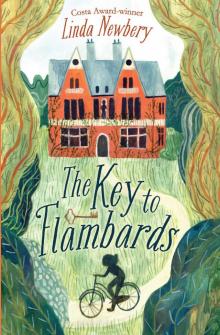 The Key to Flambards
The Key to Flambards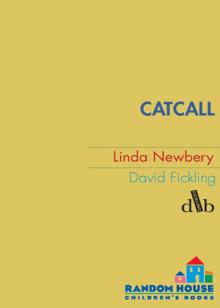 Catcall
Catcall Sisterland
Sisterland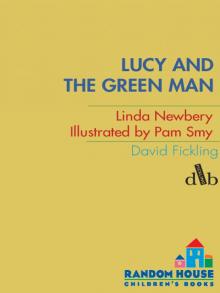 Lucy and the Green Man
Lucy and the Green Man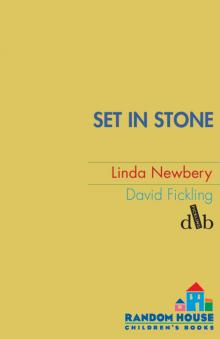 Set In Stone
Set In Stone Lob
Lob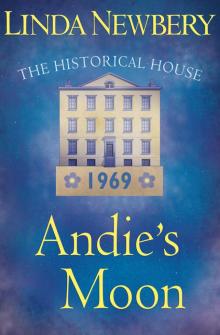 Andie's Moon
Andie's Moon The Shell House
The Shell House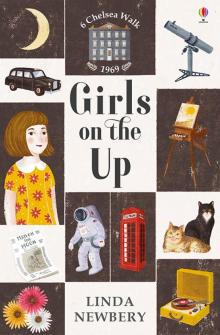 Girls on the Up
Girls on the Up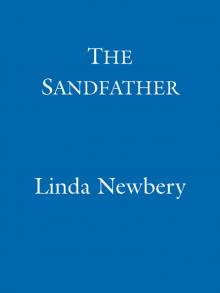 The Sandfather
The Sandfather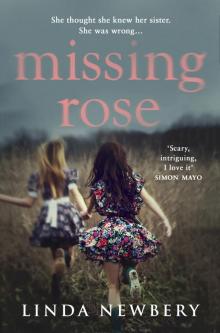 Missing Rose
Missing Rose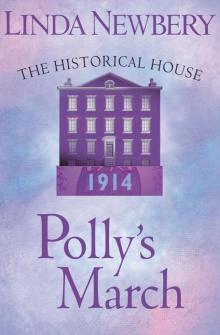 Polly's March
Polly's March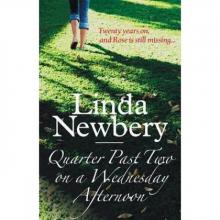 Quarter Past Two on a Wednesday Afternoon
Quarter Past Two on a Wednesday Afternoon Flightsend
Flightsend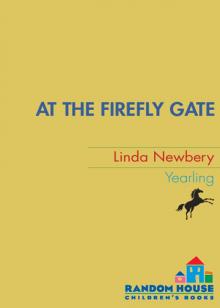 At the Firefly Gate
At the Firefly Gate